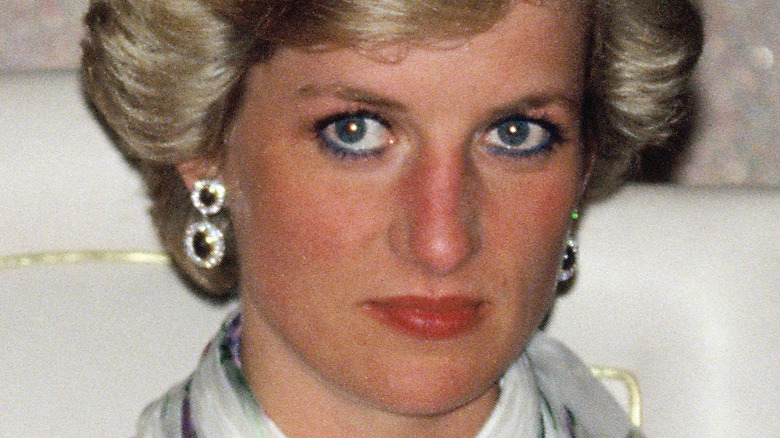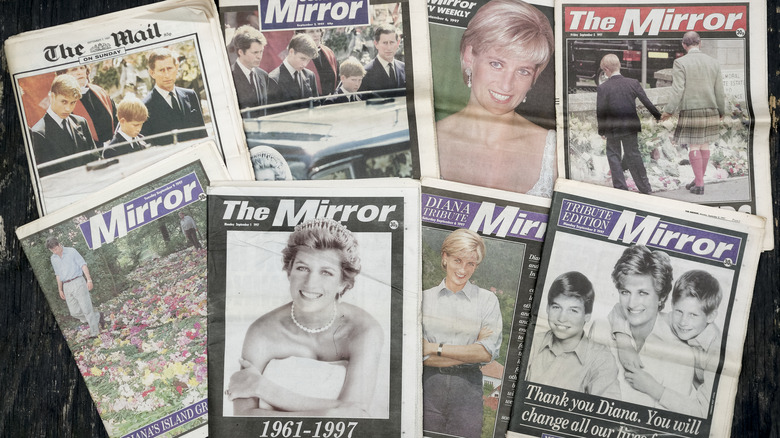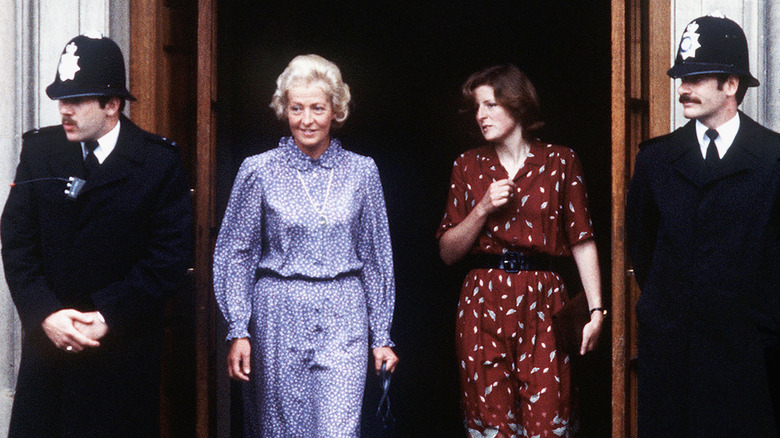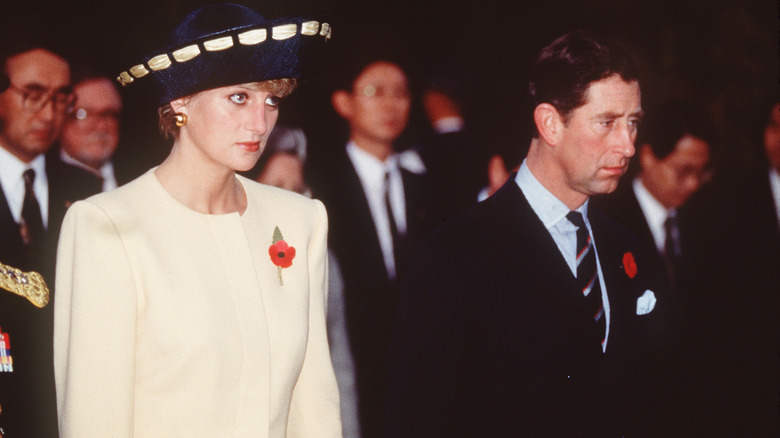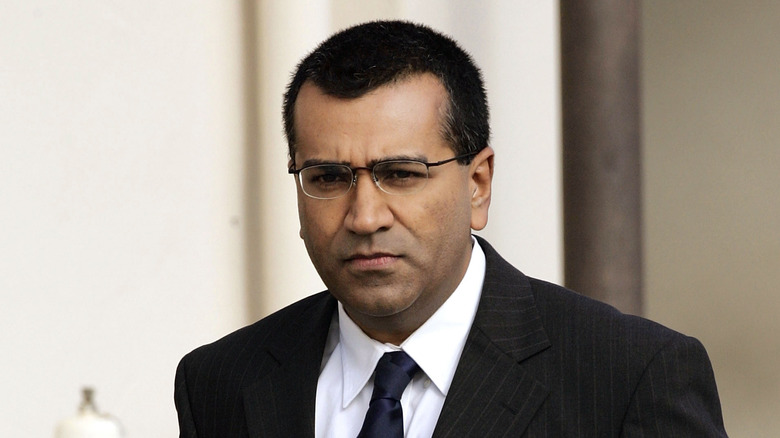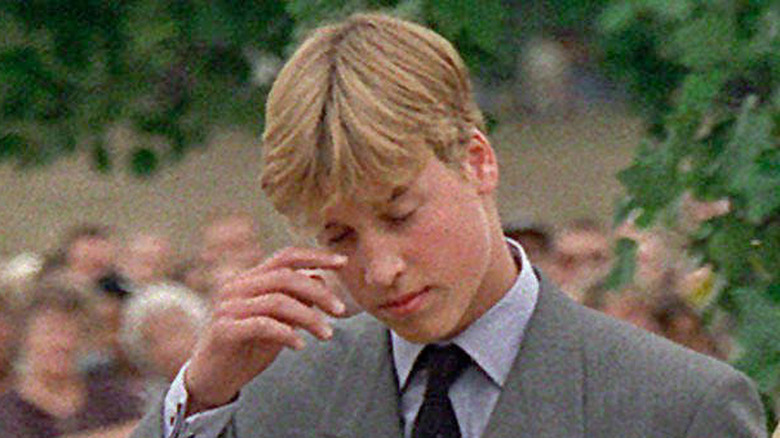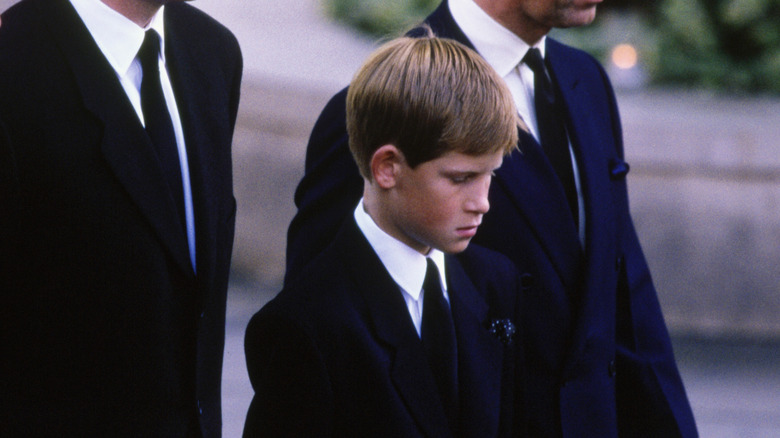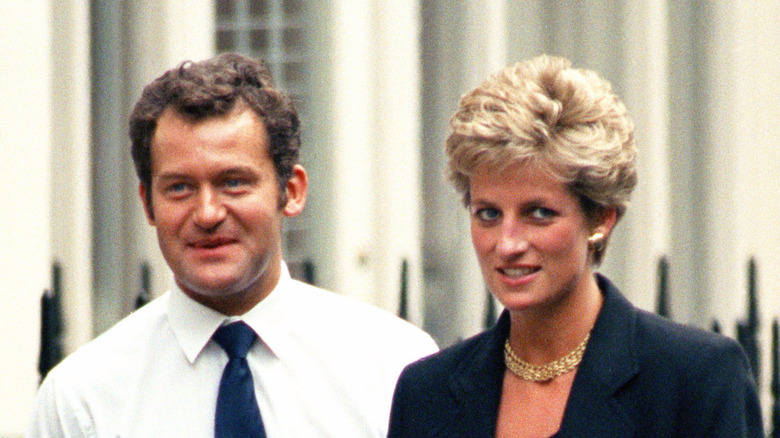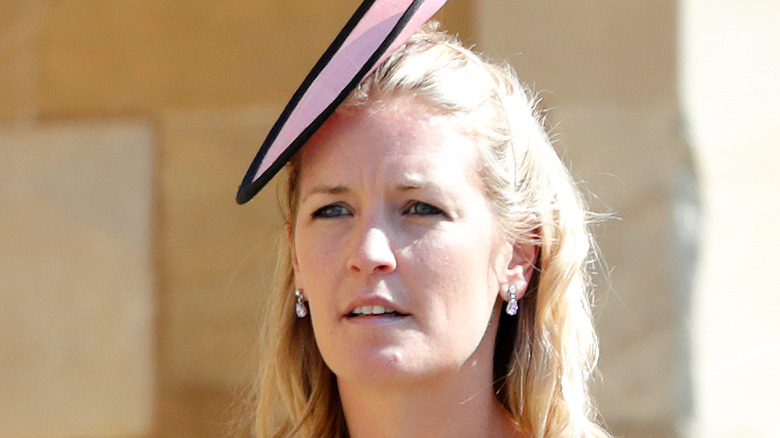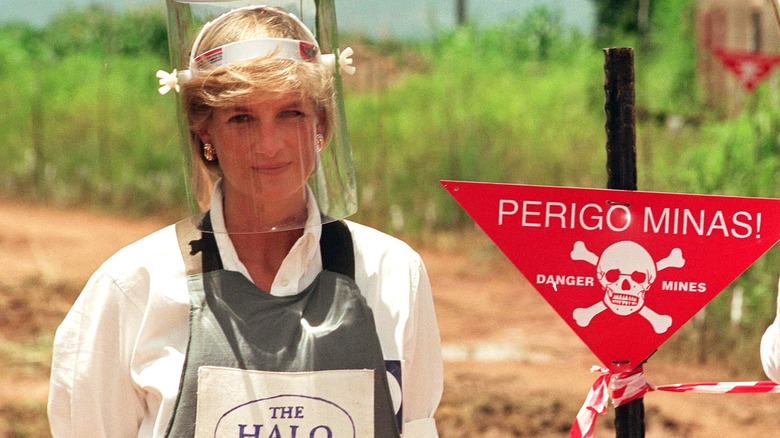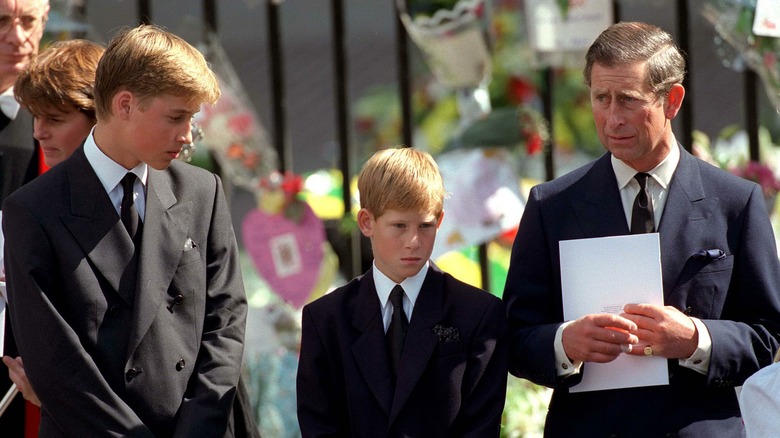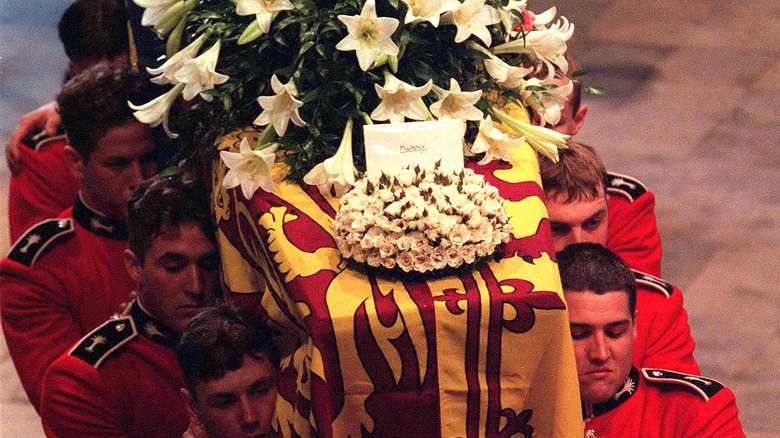Here's What Was In Princess Diana's Will
The death of Diana, Princess of Wales, was a shock to the entire world. When she took her last breath in a Paris tunnel, aged just 36, the outpouring of grief and sympathy was something most people had probably never seen in their lifetime. Tony Blair famously dubbed her "the People's Princess" after she died, and she really was. Her funeral was watched by 2.5 billion people around the globe.
Because Diana was young, beautiful, and very rich, the thought of her dying, let alone in such a violent way, had probably never occurred to virtually anyone. But when you are part of a family like the Windsors, you have to have your ducks in order when it comes to what happens if and when you die. So fortunately, Diana had made a will a few years before her death, while still married to Prince Charles. (And as her passing proves: no matter how old you are or how much you don't want to think about the reality that you will die, write a will. Just do it.)
Because she had a will, there shouldn't have been too much drama around who got what and when. Yet somehow, what was a relatively simple document led to quite a few issues. From a court case over the will to Diana's wishes not being followed to the letter to the reason one executor was removed from his job, here's what was in Princess Diana's will, and the drama around it.
Why we even know what's in it
One of the most extraordinary things about Princess Diana's will is that we know what's in it in the first place. This didn't have to happen; in fact, for most royals, it doesn't happen.
Prince Philip, the Duke of Edinburgh and husband of Queen Elizabeth II, died in 2021, just a few months shy of his 100th birthday. If you have been waiting with bated breath to learn how he distributed his largesse, you will need to live to be even older than he was. According to the BBC, five months after he died, a court ruled Philip's will would remain sealed for 90 years, and even then, people could only petition to make it public; it isn't guaranteed. The official reason is to protect the "dignity and standing" of Queen Elizabeth, although that just makes it sound like there's some scandalous stuff in the will. Sir Andrew McFarlane, the guardian of a safe containing 30 sealed will of royals who have passed on, said, "Whilst there may be public curiosity as to the private arrangements that a member of the Royal Family may choose to make in their will, there is no true public interest in the public knowing this wholly private information."
So, why do we know about Diana's? The AP reports that both the royal family and the Spencers let it be so, since everyone was obsessing over every detail of her death. Rather than fighting the onslaught of interest, they let the public see the document.
Why weren't her wishes followed?
Princess Diana had trouble trusting people throughout her adult life, which makes sense since in her position you'd feel like everyone around you was trying to get something from you, or acting as a spy for your estranged husband, or going to leak private details to a tabloid. But the two people assigned to carry out Diana's final wishes as executors of her will should have been the most trustworthy people she knew: her mother and sister, Frances Ruth Shand Kydd and Lady Elizabeth Sarah Lavinia McCorquodale, respectively. (The two are pictured above leaving the hospital after Prince William's birth, in all their 1980's glory.)
Yet these two women immediately went to court over the will, for reasons that are not really clear. What is known is they were successful in court, according to Reader's Digest, obtaining a "variation order" that allowed them to make certain changes both to the requests laid out in Diana's will and a document called a "Letter of Wishes," which was written one day later, and in normal circumstances would be just as legally binding as the will.
Don't worry, they weren't doing this for selfish reasons, trying to get Diana's money for themselves or anything like that. But they did do it in order to alter the princess' very simple, straightforward wishes, none of which were affected by her divorce, which happened three years after she wrote her will. It didn't seem to make much sense. (More on who those changes affected later.)
Where did her money come from?
Princess Diana had quite a lot of valuable stuff to leave to people in her will, including a big ole pile of money. But how did that even happen? Before her marriage, then-Lady Diana worked as a kindergarten teacher and a part-time nanny, the latter of which, her employer Mary Roberts told Inside Edition, paid the equivalent of $5 an hour. While this was notable because it made her the first woman to hold down a paying job of any kind before marrying into the royal family, it obviously didn't make her rich. Especially since she only did it for a couple years, walking down the aisle with Prince Charles when she was just 20 years old.
Yet when she died, Diana's estate was worth £21 million ($31.5 million in 1997 dollars), according to the Latin Times. Not to mention all the priceless jewelry and designer clothing she owned.
So where did she get all the cash? Quite simply, the old-fashioned way: in her divorce settlement. When Charles and Diana finally got out the marriage they both hated in 1996, the New York Times reported that while the settlement wasn't officially announced, sources were saying it was "$22.5 million in cash, as well as about $600,000 a year to maintain her private office." The large lump sum was apparently in place of any alimony. Diana also had to drop her HRH title — in other words, the right to be called "Her Royal Highness" — which Charles is said to have insisted on out of spite.
The executor who wasn't
While Diana's mother and sister ended up as her executors by the time she died, that wasn't what was in her will originally. Instead of her sister, Diana had named her private secretary Patrick Jephson. But he resigned from his position very suddenly in 1996, and a subsequent codicil to the will removed him as executor and added Lady Sarah McCorquodale.
After Diana's death a year later, Jephson went on to write a book about his time working for her, called "Shadows of a Princess." The royal family was not happy. In fact, the Guardian reports that Prince William thought the book was worth commenting on in his first ever solo interview with the press, saying, "Of course Harry and I are both quite upset about it – that our mother's trust has been betrayed and even now she is still being exploited." But that was after Diana's death, of course. So what happened to make Jephson quit so suddenly and be removed as an executor of her will?
In 2021, Jephson again went on the record about his relationship with Diana, although the timing was a bit suspect. Reporter Martin Bashir (pictured) had just been found to have lied, forged documents, and manipulated Diana in order to score his infamous interview with her for "Panorama." Jephson wrote in the Daily Mail that Bashir had told Diana lies about him as well, and their trust was broken. When Jephson found out she'd done the interview, he left her service.
Prince William
Prince William was just 15 when his mother died. His grief was splashed across the front pages and broadcast on TV, as he viewed the sea of flowers left in his mother's honor and walked behind her coffin at her funeral.
In a different time, William would probably have inherited everything, since he was the oldest son and heir. Future kings need to be rolling in it, after all. But before Princess Diana's will was published, rumors flew around that it would be quite the opposite, the AP reported. Sources were saying that William's younger brother Harry might get most or all of their mother's estate, the logic being that Harry would have to make his own way in the world, while William would eventually receive huge amounts of money from lands owned by the Crown. But in the end, it turned out she'd left everything to them evenly.
Originally, William and Harry were supposed to spilt 75% of Diana's estate, but when her mother and sister challenged the will the brothers ended up with basically all of it, however, the court also decided they were not allowed to touch it until they each turned 30, rather than 25 as Diana originally stipulated. William received his half of the inheritance in 2012. Based on an estimate by the Telegraph (via Newsday) about how much her estate would have grown with investments over the years, is thought to have come to about $16 million. Of course, no amount is worth losing your mother.
Prince Harry
Because he's younger than his brother, it wasn't until 2014 that Prince Harry turned 30 and inherited his half of his mother's estate, estimated to be about $14 million at that time. While he probably expected to live a life of royal luxury even without that money, things didn't go exactly as planned.
After Harry married actress Meghan Markle, his relationship with his family took a turn for the worst. While both sides have leveled accusations against the other, it's clear that the stuffy royals didn't appreciate the American Meghan very much. Eventually it got so bad that Harry and Meghan left the royal family behind and moved to America. In an interview, Prince Harry told Oprah that they had been cut off financially by his family, and that his inheritance was the only reason they could afford to escape. "I have what my mum left me and without that we wouldn't have been able to do this. It's like she saw it coming and she's been with us through this whole process," he said (via LBC).
William and Harry didn't just inherit money. They also own a lot of Diana's stuff as well, and shortly after she died, they each picked a meaningful piece of jewelry from her collection. William chose her Cartier watch and Harry chose her huge sapphire and diamond engagement ring. If you know your royal facts, that might surprise you, since that ring has been on Kate Middleton's finger since 2010. Vanity Fair reports that because William got engaged first, the two traded their keepsakes, and Meghan now wears the Cartier watch.
Paul Burrell
At the time of her death, perhaps no one was closer to Princess Diana than her butler Paul Burrell. She famously called him "her rock," as every single article about him will tell you. The Telegraph reports Burrell was "the most senior trusted member of her staff," with duties that "went far beyond that of mere butler." He claims she used to leave him notes that said "What would I do without you?"
When he learned she'd been in a car accident, he flew to Paris immediately planning to stay by her hospital bed. Instead, he would end up doing an all-night vigil next to her coffin before her funeral. He was the only mourner who wasn't related to Diana allowed at her burial at her family's ancestral home of Althorp. And he was the one who went through and cataloged all of her stuff. He said, "I knew I had to do it. Who else could? She was surrounded by the richest, the most educated, the most landed people in the country, and she chose me, a lorry driver's son from Derbyshire. She called me her rock, and I was there."
Even though she left very few direct bequests, Diana couldn't forget her loyal butler. Burrell received $82,500 in Diana's will, according to the New York Times. Sadly, in the following decades he would cash in pretty hard on his connection to Diana and was even accused of stealing from her after she died (he was eventually acquitted of the charges).
Princess Diana's many godchildren
If you are friends with or work for a royal, the ultimate status symbol isn't dropping their name at parties but asking them to be godparent to one of your children. This ensures your kid is connected enough to someone on high to ensure at least birthday cards and a wedding present they can proudly show off. And it's not like there's a limit. When she died, Princess Diana had agreed to be godmother to 17 children.
Diana obviously cared about these kids (all of whom were still minors when she died). She left very few personal bequests in her will, but she remembered all of them, outlining in her "Letter of Wishes" document what she wanted them to inherit (via The Times): "I would like you to divide, at your discretion, my personal chattels between my sons and my godchildren. The division is to be three-quarters in value to my sons and one quarter between my godchildren." "Chattels" is a legal term for "stuff," and when you are talking about Princess Diana, that stuff can be incredible. Splitting 25% of jewelry and clothing and cars, even among 17 people, doesn't sound too shabby. In fact, it's estimated it would have been worth $160,000 per child.
Unfortunately for them, the court case brought by Diana's mother and sister also changed this part of the will drastically. In the end, each godchild only got one item each, picked by the executors, which meant they ended up with what Investment News says some of them called a "tacky memento."
What about her charities?
One thing Princess Diana was most known for was her charitable work. Unlike the other stiff, formal royals, she seemed to really feel for the less fortunate she visited, like she cared about making a difference and not just smiling, nodding, and getting a photo op. So it's kind of weird that no charities are named in her will.
There's nothing wrong with wanting to leave everything to your kids, but considering Princes William and Harry were never going to be poor, they didn't actually need the inheritance like most normal people might. But for whatever reason, Diana did not single out any charities by name in her will, nor did she leave any of them a lump sum.
They did get some money, although by a more complicated route. In her "Letter of Wishes" she set up a discretionary fund, according to Readers Digest. This was a relatively small amount, thought to be about £100,000 ($150,000). Over time, the investments in the fund would increase in value, and the charities would benefit from it, per Trust and Will. Or part of it, anyway, since it was also available to William and Harry, as well as their eventual wives. So it wasn't much to start with, and in theory one of the sons could just clean it out. Bad luck, charities. The organizations did, thankfully, get something that went towards only their coffers, reports CBS News, and could be quite lucrative: Diana's name and image rights. So at least she didn't forget her charities completely.
The tax bill
The rich don't do a lot to pull their weight, especially when it comes to taxes, but with the royal family, sometimes their business is public enough that it would look really bad if they got out of what they owed the government. That was the case with Princess Diana's estate.
While it's hard to feel bad for Princes William or Harry considering they got 8-figure inheritances anyway, a big chunk of what their mother left them went to taxes. The interesting thing is that technically, without breaking any laws or even using any shady loopholes, Prince Charles could have saved his sons that massive tax bill.
According to the Irish Times, Charles could have gone to court over the will, which had been drawn up before the couple divorced, and therefore before Diana had received her lump sum divorce settlement. In other words, when she wrote the will, she was dealing with a much smaller amount of money than what she ended up with. If Charles had filed a so-called Barder application, he could have tried to get the millions from the divorce settlement back. Then he would have put the money in trust for his sons, which is taxed differently and would have resulted in a much smaller bill. But considering how predictably awful the headlines would have been if Charles gave even the mistaken impression he was stealing from his dead ex-wife and his children, and/or receiving preferential treatment from the government because of who he was, he decided against it.
Other details in her will
Princess Diana's will was a relatively short document, and even then most of it is made up of what is obviously legalese, using 100 words to say what non-lawyers could in 10. But there are still a few more interesting things you can glean from the full text (via CNN).
The first topic she gets out of the way, stated simply and on its own is "I wish to be buried." It's good to know that the elaborate funeral where she was transported in front of millions in her casket involved something she wanted, at least once she was buried at her childhood home. It's interesting to think about if her wishes would still have been honored if she chose some different disposition of her remains, like cremation.
Since Diana had drawn up the will in 1993, years before she and Charles officially divorced, it is written as if he is still her husband. But one sentence would end up being necessary, regardless: "Should I predecease my husband ... he will consult with my mother with regard to the upbringing in education and welfare of our children." Hopefully Charles acceded to her wishes on that.
